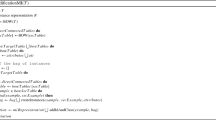Abstract
Feature selection methods often improve the performance of attribute-value learning. We explore whether also in relational learning, examples in the form of clauses can be reduced in size to speed up learning without affecting the learned hypothesis. To this end, we introduce the notion of safe reduction: a safely reduced example cannot be distinguished from the original example under the given hypothesis language bias. Next, we consider the particular, rather permissive bias of bounded treewidth clauses. We show that under this hypothesis bias, examples of arbitrary treewidth can be reduced efficiently. The bounded treewidth bias can be replaced by other assumptions such as acyclicity with similar benefits. We evaluate our approach on four data sets with the popular system Aleph and the state-of-the-art relational learner nFOIL. On all four data sets we make learning faster for nFOIL, achieving an order-of-magnitude speed up on one of the data sets, and more accurate for Aleph.
Access this chapter
Tax calculation will be finalised at checkout
Purchases are for personal use only
Preview
Unable to display preview. Download preview PDF.
Similar content being viewed by others
References
Liu, H., Motoda, H., Setiono, R., Zhao, Z.: Feature selection: An ever evolving frontier in data mining. Journal of Machine Learning Research - Proceedings Track 10, 4–13 (2010)
Lavrac, N., Gamberger, D., Jovanoski, V.: A study of relevance for learning in deductive databases. J. Log. Program. 40(2-3), 215–249 (1999)
Appice, A., Ceci, M., Rawles, S., Flach, P.A.: Redundant feature elimination for multi-class problems. In: ICML, vol. 69 (2004)
Raedt, L.D.: Logical and Relational Learning: From ILP to MRDM (Cognitive Technologies). Springer-Verlag New York, Inc. (2008)
Plotkin, G.D.: A note on inductive generalization. Machine Intelligence 5, 153–163 (1970)
Kuželka, O., Železný, F.: Seeing the world through homomorphism: An experimental study on reducibility of examples. In: Frasconi, P., Lisi, F.A. (eds.) ILP 2010. LNCS, vol. 6489, pp. 138–145. Springer, Heidelberg (2011)
Nassif, H., Al-Ali, H., Khuri, S., Keirouz, W., Page, D.: An inductive logic programming approach to validate hexose binding biochemical knowledge. In: De Raedt, L. (ed.) ILP 2009. LNCS, vol. 5989, pp. 149–165. Springer, Heidelberg (2010)
Erickson, J.: CS 598: Computational Topology, course notes, University of Illinois at Urbana-Champaign (2009)
Kuželka, O., Železný, F.: Block-wise construction of acyclic relational features with monotone irreducibility and relevancy properties. In: ICML 2009: the 26th Int. Conf. on Machine Learning (2009)
Kuželka, O., Železný, F.: Block-wise construction of tree-like relational features with monotone reducibility and redundancy. Machine Learning 83, 163–192 (2011)
Krogel, M.-A., Rawles, S., Železný, F., Flach, P.A., Lavrač, N., Wrobel, S.: Comparative evaluation of approaches to propositionalization. In: Horváth, T., Yamamoto, A. (eds.) ILP 2003. LNCS (LNAI), vol. 2835, pp. 197–214. Springer, Heidelberg (2003)
Dechter, R.: Constraint Processing. Morgan Kaufmann Publishers (2003)
Feder, T., Vardi, M.Y.: The computational structure of monotone monadic snp and constraint satisfaction: A study through datalog and group theory. SIAM J. Comput. 28(1), 57–104 (1998)
Maloberti, J., Sebag, M.: Fast theta-subsumption with constraint satisfaction algorithms. Machine Learning 55(2), 137–174 (2004)
Atserias, A., Bulatov, A., Dalmau, V.: On the power of k-consistency. In: Arge, L., Cachin, C., Jurdziński, T., Tarlecki, A. (eds.) ICALP 2007. LNCS, vol. 4596, pp. 279–290. Springer, Heidelberg (2007)
Rossi, F., van Beek, P., Walsh, T. (eds.): Handbook of Constraint Programming. Elsevier (2006)
De Raedt, L.: Logical settings for concept-learning. Artif. Intell. 95(1), 187–201 (1997)
Gottlob, G., Leone, N., Scarcello, F.: Hypertree decompositions and tractable queries. Journal of Computer and System Sciences 64(3), 579–627 (2002)
Landwehr, N., Kersting, K., Raedt, L.D.: Integrating naïve bayes and FOIL. Journal of Machine Learning Research 8, 481–507 (2007)
Mackworth, A.: Consistency in networks of relations. Artificial Intelligence 8(1), 99–118 (1977)
Helma, C., King, R.D., Kramer, S., Srinivasan, A.: The predictive toxicology challenge 2000-2001. Bioinformatics 17(1), 107–108 (2001)
Žáková, M., Železný, F., Garcia-Sedano, J.A., Masia Tissot, C., Lavrač, N., Křemen, P., Molina, J.: Relational data mining applied to virtual engineering of product designs. In: Muggleton, S.H., Otero, R., Tamaddoni-Nezhad, A. (eds.) ILP 2006. LNCS (LNAI), vol. 4455, pp. 439–453. Springer, Heidelberg (2007)
Author information
Authors and Affiliations
Editor information
Editors and Affiliations
Rights and permissions
Copyright information
© 2013 Springer-Verlag Berlin Heidelberg
About this paper
Cite this paper
Kuželka, O., Szabóová, A., Železný, F. (2013). Reducing Examples in Relational Learning with Bounded-Treewidth Hypotheses. In: Appice, A., Ceci, M., Loglisci, C., Manco, G., Masciari, E., Ras, Z.W. (eds) New Frontiers in Mining Complex Patterns. NFMCP 2012. Lecture Notes in Computer Science(), vol 7765. Springer, Berlin, Heidelberg. https://doi.org/10.1007/978-3-642-37382-4_2
Download citation
DOI: https://doi.org/10.1007/978-3-642-37382-4_2
Publisher Name: Springer, Berlin, Heidelberg
Print ISBN: 978-3-642-37381-7
Online ISBN: 978-3-642-37382-4
eBook Packages: Computer ScienceComputer Science (R0)




